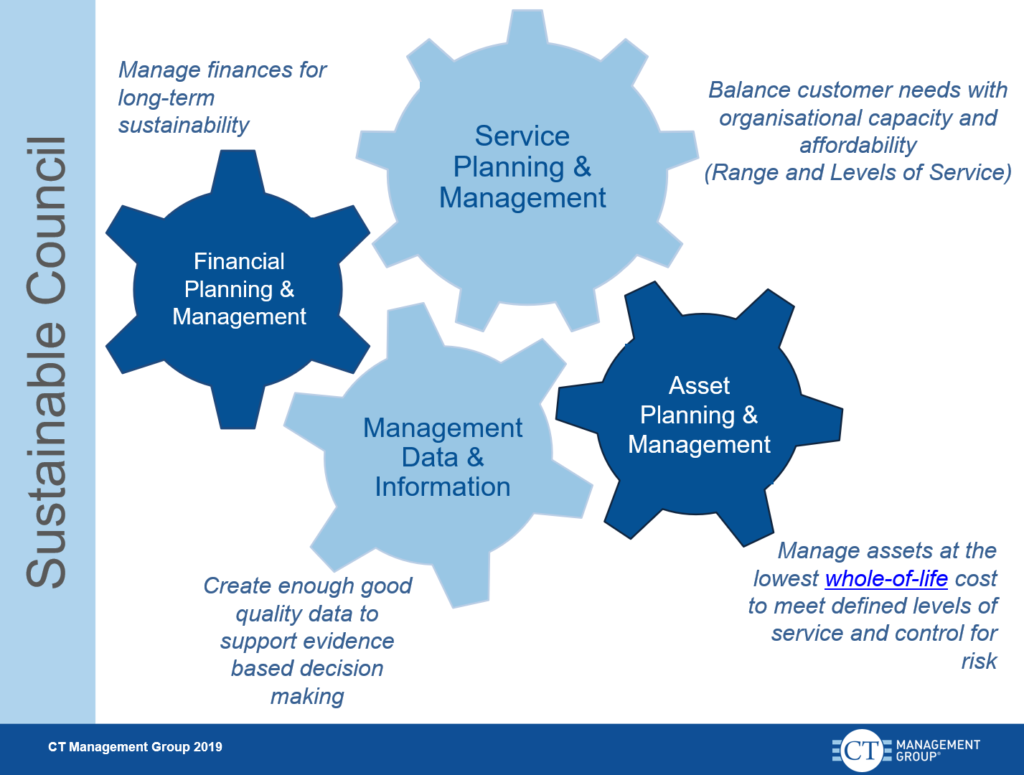CT Management’s Sustainable Council Program assists Councils to develop strategies aligned to capacity and capability to deliver in a financially sustainable framework.
The program establishes the agenda for community consultation and facilitates the issues around Council’s capacity to deliver against the community’s service and infrastructure priorities.
The Sustainable Council Program can be offered in separate elements or alternatively as a total program over a 6 to 12-month period.
The Sustainable Council Program is a forerunner to the Victorian Local Government Act 2019 as it supports many of the longer-term strategic planning initiatives required under the new legislation.
These provisions are already mandated in many of the other jurisdictions (NSW and Queensland) whilst in New Zealand the requirement is for a 30-year infrastructure plan supported by a 10-year long term plan.
The legislators (State and Federal governments) broadly speaking are requiring and mandating longer term planning against which state auditors will ultimately adjudicate.
The four cogs of the Sustainable Council Program are:
- Service Planning
- Asset Management
- Data and Knowledge
- Financial Planning
These are detailed in the diagram below.

These are the pillars of a sustainable municipality and the foundations upon which sound community consultation can be built.
Service Planning
Starting with Service Planning we work with Council to understand the range of services, levels of service and cost of services. Also, we facilitate definition of Council’s service priorities and define the demand for services into the future. Council’s 40 or 50 services will have differing demand rates, and this will be based on community need and should align with Council’s strategic priorities as defined in the Council Plan.
This process is introduced through a formal project management approach and will take most Councils 3 to 4 months. The process relies heavily on the input of Councils service managers and is primarily undertaken for 2 key reasons:
- To ensure that Council’s investment in services is achieving desired outcomes.
- To better understand each service to allow comparative choice decisions to be made when undertaking resource adjustments across the organisation.
This analysis will guide decision making with respect to the range of services and level of service Council can realistically afford now and into the future. It challenges the capacity of the organisation to understand current and future demand, growth in demand and establishes the basis for community consultation.
Asset Management
The governance framework for Asset Management is critical – assets underpin many of Council’s services and therefore their serviceability is critical to the stakeholder’s experience.
Given Council has settled its service offering (range and levels of service in the Service Planning phase) service managers can plan the future asset requirements with Council’s Asset Management team.
Asset Management Plans can then be adapted to reflect the current service priorities and assets surplus to requirements can be sold or gifted back to the community.
Sounds easy – the issue for good asset management is to be clear about the services Council is wanting to support and invest in. Once this is clear and service standards are defined the asset manager can define the technical service levels, prepare a capital budget and invest in the required assets utilised for service delivery.
Data and Knowledge
To ensure the Asset Management requirements of Council are appropriate (renewal demand per asset category, unit rates, asset condition, valuation depreciation charges etc) the Council’s data must be accurate and current.
Council wants to be able to support its decisions around asset renewal, acquisition and disposal based on high quality and current information and data.
To do otherwise increases the risk of damage to reputation or acquisition or re investment in assets that are not required.
Financial Planning
Once Council understands it service demand and has a clear capital works program (asset investment) it is able to measure the financial sustainability of its service and capital investments.
Applying escalation factors to these figures and then considering funding sources (rating levels, borrowings, reserve transfers etc.) Council can assess the financial sustainability of its services to the community.
Council is then in a position to apply the Essential Services Commission to levy above the rate cap, decrease range of services or levels of service, increase user charges or apply special rate/charge provisions to some capital works projects – or a combination of the above.
Community Consultation
When the going gets tough the stakeholders may have a solution Council hasn’t thought of.
To find out more about the Sustainable Council Program or for any further information or assistance on any of our services, please contact CT Management Group on P: 1300 500 932 or via our Contact form below: